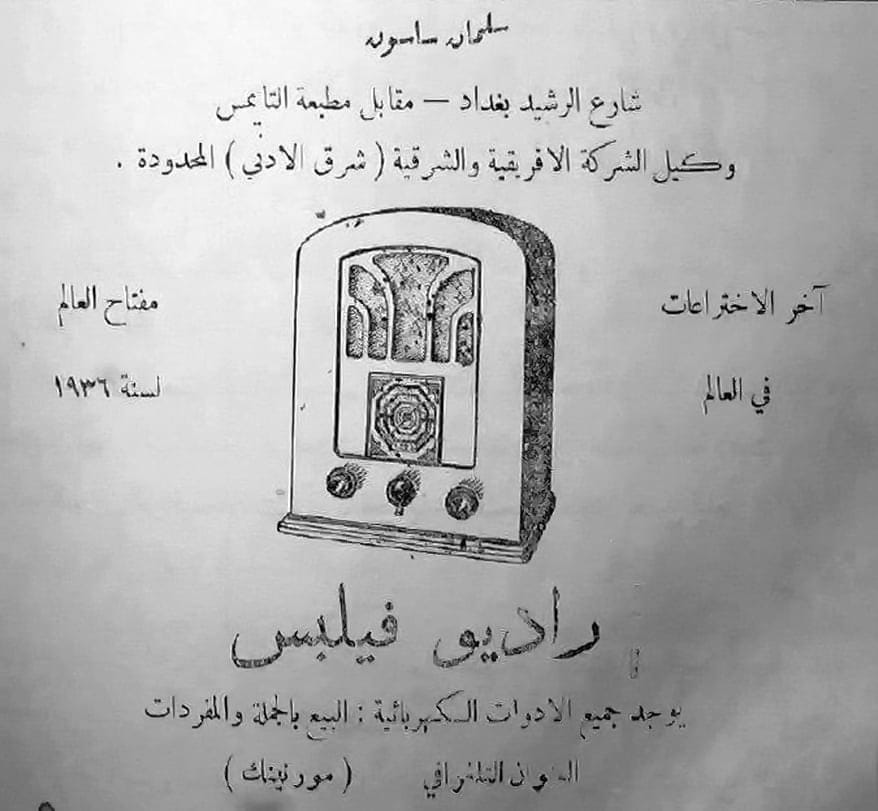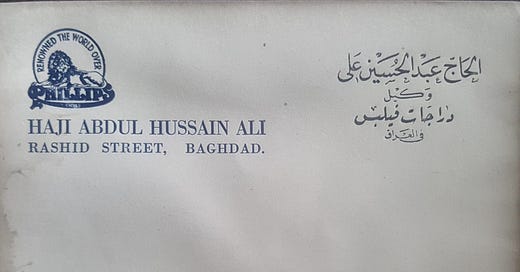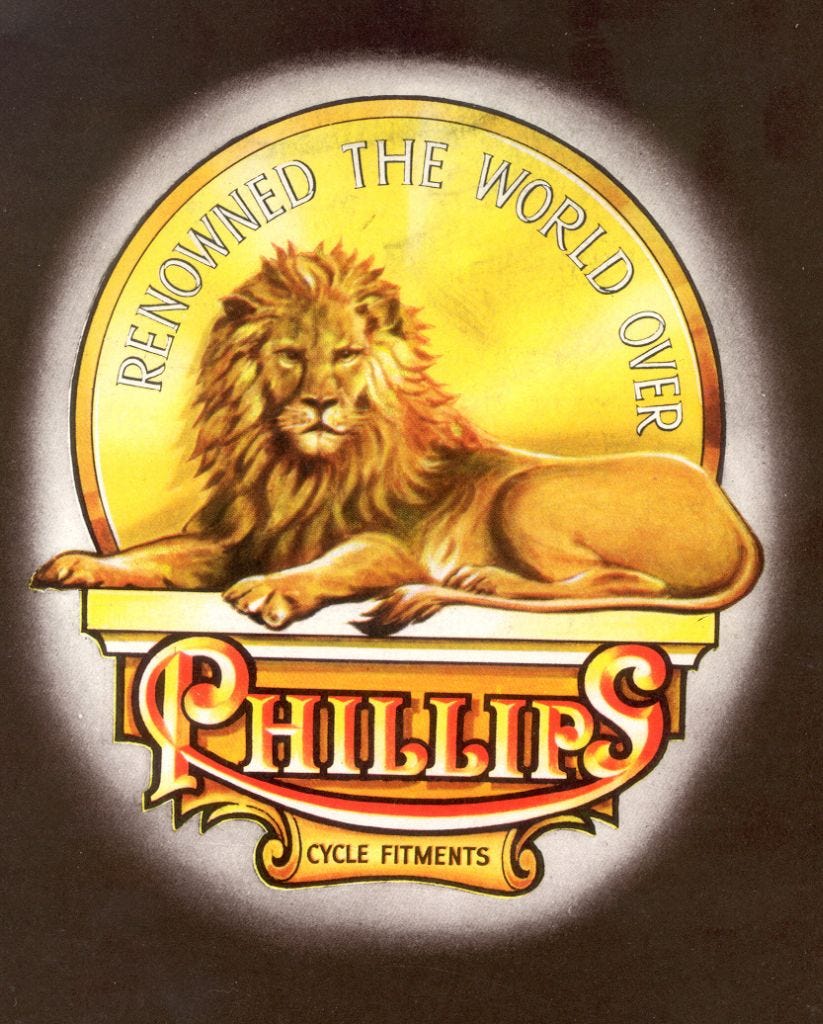When grandpa and Jews were Baghdad's merchants
Similarity in names of two corporations made me chase a long gone history
A friend shared a few old Iraqi ads. One of them was from 1936 and showed Iraqi Jewish merchant Salman Sassoon advertising for Radio Philips that he sold at his store on Baghdad’s famed al-Rashid Street. Around the same time, my grandfather Abdul-Hussain Ali also sold Phillips at his store at the same al-Rashid Street. But grandpa sold Phillips bikes, not Philips radios.

The similarity piqued my curiosity. Five books about Iraq’s Jews later, many gaps remain unanswered. The story I write below offers a background. The rest will be up for imagination and speculation.
In 1891 in the Netherlands, Philips — a Jewish family — founded a company that they named after themselves. In 1927, Anton Philips started broadcasting on shortwave while his company manufactured radios. In 1930, the company opened a factory in Calcutta, India, from where it exported to markets like Iraq. Also in India were satellite offices of the Iraqi Sassoon family, the “Rothschilds of the East.” One of the Sassoons, David, lived and raised his family, including his son Salman, in Baghdad’s Murabaa neighborhood, off of al-Rashid.
Iraq started experimenting with radio broadcast in 1932. By July 1936, state radio had gone on the air with the earliest programming including songs by Jewish Iraqi singer Sulaimah Mrad (the wife of famous Sunni Iraqi singer Nazem al-Ghazali), and violin performances by Saleh al-Kuwaiti, also a Jewish Iraqi.
With the state radio on the air, Salman Sassoon must have found it a good opportunity to import and advertise for his new technology — the made-in-India Philips radio. Sassoon benefited from his family’s network, especially its satellite office in Mumbai.
Like their peers around the world, Iraqis also enjoyed using bikes in their transport. Bike companies manufactured lightweight bicycles for women, heavier weight ones for men, and more expensive special editions on the occasion of the coronation of kings, such as British George VI in 1937 and Iraqi Faisal II in 1939).
In 1896, In Birmingham, England, ‘Cycle King’ John Alfred Phillips (no connection to Dutch Philips) set up a partnership with two others for the purpose of manufacturing bicycle pedals and breaks. Phillips patented its model of breaks and became famous as a bike fitments company. It was a matter of time until the company started producing bikes, but just when it did, it signed a contract with its competitor Raleigh, under which Phillips promised not to sell its bikes in England and only export them to foreign markets. In return, Raleigh exclusively used Phillips products to fit its bikes made for the British market.
In 1902, my grandfather Abdul-Hussain Muhammad-Ali was born in Baghdad. In his boyhood, his father Muhammad-Ali left his mother and a younger sibling, and married another woman. Abdul-Hussain only received basic reading and learning lessons, after which he found himself in the market trying to eke a living.
In 1936, the British bike company Phillips opened a factory in Madras, near India’s Mumbai, where it produced fitments and bikes that were exported all over the world, including to Iraq. The global reach of Phillips made it coin its slogan: “Renowned the world over.”
At age 33, Abdul-Hussain had been trying his hand with trading different items. In 1938, he imported his first batch of Phillips bikes from Mumbai, and must have relied on the Sassoon network and connections. Sales were barely covering his expenses.
In 1939, the outbreak of WWII forced all British factories to switch to military production. The British army in Iraq needed bikes for its troops and police. Abdul-Hussain was lucky to have imported the last shipment from India. He had stored enough bikes that made the Iraqi government and the British mandate desperately seek his stock. Bike prices hiked multi folds, and Abdul-Hussain was transformed, overnight, into a big merchant. From then on, he went on to amass an enormous wealth.

In the family, he is always remembered as saying that Baghdad’s Jews were good to him, and helped him when he needed them. He never mentioned any specific names, but Sassoon’s store on al-Rashid might have been not far away from Abdul-Hussain’s store, and the two could have met and had good business relations.
Harassment against Jews in Iraq started in 1935, esepcially after Syrian cleric Ezzedine al-Qassam, an early radical Islamist, was killed in Haifa during a battle with the British. In 1941, Baghdadi Jews suffered the Farhoud pogrom, but still hung on to Iraq, with philanthropic donations still investing in building and expanding existing Jewish social and welfare networks, including schools and clinics.
After 1948, the presence of Jews in Iraq became untenable. In 1950, Iraqi parliament passed a legislation that offered Jews a bargain: If they drop their nationality, they will be allowed to leave the country once and for all. By 1953, over 120,000 Jews had left Iraq, ending a presence that had predated the existence of Islam in Mesopotamia by at least a millennium.
Merchants like Abdul-Hussain felt indebted to Jewish merchants. Many reports suggested that Iraqis hid Jewish families to protect them. Iraqi merchants also bought Jewish property at market price in order to mitigate Jewish losses. By the time their exodus was complete, the Jews still left behind vast property that was eventually confiscated by the state and sold to Iraqis.
Who exactly showed Abdul-Hussain the ropes of importing from India? And who helped him import the bikes that turned him into a wealthy businessman? These questions might be unanswerable. Yet the background story might offer some clues and space for imagination and speculation.







These kind of stories about the old (pre-1948) Middle East are so refreshing and rare. They demonstrate that Jews and their Arab neighbors actually had real human relationships, not just ideological shouting matches. Tell us some more stories, and thanks for your great work.
So interesting ! M'y grand father who came from salonica in thé ottoman empire built thé megam radio company which made radio valves ,company that whas baught later by Radiotechnique a subsidiary in France of Phillips.